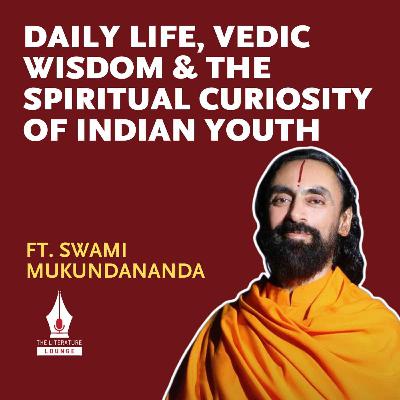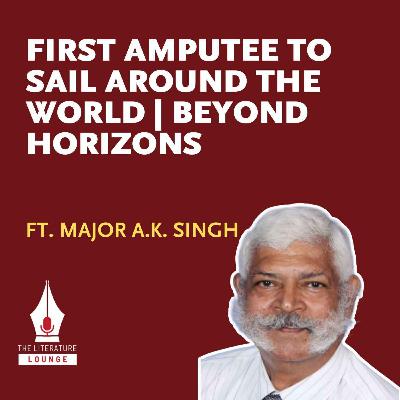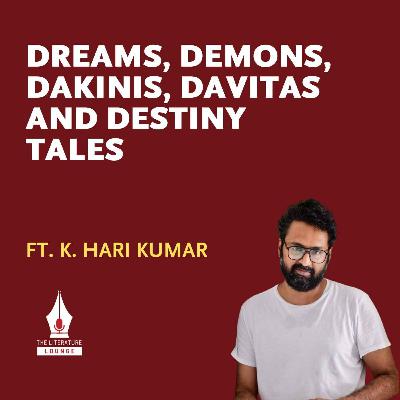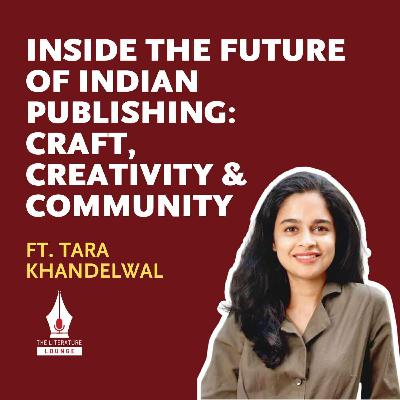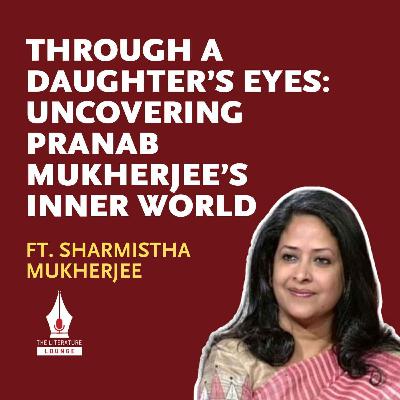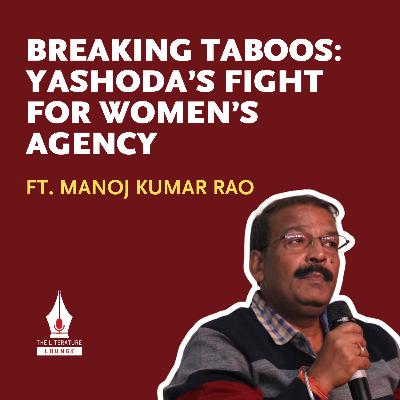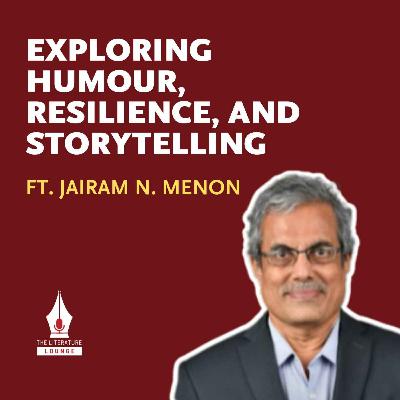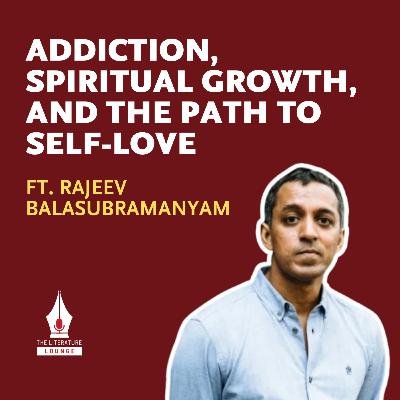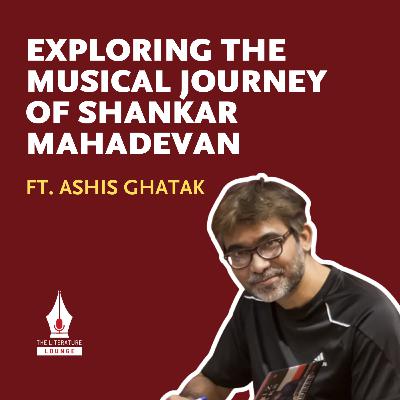Discover The Literature Lounge
The Literature Lounge

The Literature Lounge
Author: Mohua Chinappa
Subscribed: 3Played: 4Subscribe
Share
© 2025 @2025 The Literature Lounge
Description
The Literature Lounge, hosted by Mohua Chinappa is a popular podcast series dedicated to the world of books and the brilliant minds behind them. Through exclusive conversations, we uncover how authors craft captivating stories, thought-provoking essays, insightful biographies, provocative prose and poetry that spark possibilities within us.
From dreaming big to breaking conventions, each episode explores books that ignite fresh ideas – one page at a time. If you love literature, you’ll feel right at home here.
Hosted on Acast. See acast.com/privacy for more information.
39 Episodes
Reverse
In this captivating episode, renowned author and feminist Kiran Manral shares her multifaceted writing career, from her early days as a blogger to becoming one of India's distinguished literary voices. Kiran delves into her experiences in advertising and journalism, which have enriched her storytelling across various genres. She also provides an exclusive peek into her book, "Rising 2.0: 20 More Women Who Changed India," emphasizing the importance of preserving women's legacies. The conversation explores the necessity of women celebrating their professional milestones, building a supportive sisterhood, and the joys and challenges of genre diversity in writing. This episode is a treasure trove of insights for anyone passionate about literature, feminism, and professional growth.What You Will Learn in This Episode:Join host Mohua Chinappa for a profound conversation with author Kiran Manral, where you will gain invaluable insights into the world of writing, feminism, and personal growth. In this episode, you will learn:The Art of Literary Evolution: Discover Kiran Manral's personal journey from the early, intimate world of blogging to establishing herself as a formidable voice in Indian literature, and how her backgrounds in advertising and journalism uniquely shape her storytelling.The Mission Behind "Rising 2.0": Understand the meticulous inspiration and selection process for her book, "Rising 2.0," and why documenting the legacies of trailblazing women is a critical act of feminist preservation.Firsthand Accounts of Resilience: Hear the most memorable and inspirational moments from Kiran's interviews with extraordinary women, and the powerful stories that left a lasting impact on her.This episode is a treasure trove of motivation for aspiring writers, professionals, and anyone who believes in the power of women's stories to change the world.✅ Subscribe To Our Channel: / thelitlounge Stay updated!🔔Follow Us On:Mohua Chinappa► Instagram: /mohua_chinappa► LinkedIn: /mohua-chinappaThe Literature Lounge► Instagram: / litlounge_pod Connect with the GuestKiran Manral: ► Instagram: / kiranmanral ► For any queries EMAIL: hello@themohuashow.comCopyright ©2025 The Literature Lounge. All Rights Reserved.Disclaimer: The views expressed by our guests are their own. We do not endorse and are not responsible for any views expressed by our guests on our Show and its associated platforms. Hosted on Acast. See acast.com/privacy for more information.
What really happens behind the scenes in the world of books? How is artificial intelligence changing publishing, and what does it take to build a meaningful career with words?In this illuminating episode of The Literature Lounge, host Mohua Chinappa sits down with Sangeetha Menon, a publishing professional whose unexpected writing journey led her into the heart of the literary world. Sangeetha reveals the often-overlooked role of a rights manager, shares why embracing technology is crucial for publishing's future, and makes a compelling case for why vulnerability might be a writer's greatest strength.What You'll Learn:- How a random start in writing can lead to a fulfilling career- The complex role of a rights manager in a publishing house- Whether editing, rights acquisition, or international sales is most challenging- Why shunning AI and tech is not the answer for modern publishing- How audiobooks and print books can peacefully coexist- Why being vulnerable can transform your creative work- The power of taking small, consistent steps toward big goalsReferences:Wordpress: https://en.wikipedia.org/wiki/WordPress.com National Poetry Month: https://en.wikipedia.org/wiki/National_Poetry_Month Green Literature: https://en.wikipedia.org/wiki/Ecocriticism Body Talk: https://kellybjensen.com/body-talk/ ✅ Subscribe To Our Channel: /@theliteraturelounge_tllStay updated! 🔔Follow Us On:Mohua Chinappa► Instagram: /mohua_chinappa► LinkedIn: /mohua-chinappaThe Literature Lounge► Instagram: / litlounge_pod Connect with the Guest: Sangeetha Menon►Instagram: https://www.instagram.com/theclosetwriterchronicles/ Copyright ©2025 The Literature Lounge. All Rights Reserved.Disclaimer: The views expressed by our guests are their own. We do not endorse and are not responsible for any views expressed by our guests on our Show and its associated platforms.#TheLiteratureLounge #PublishingIndustry #RightsManager #AIinPublishing #WritingJourney #BookPublishing #VulnerabilityInWriting #Audiobooks #CreativeProcess #MohuaChinappa Hosted on Acast. See acast.com/privacy for more information.
Is there really a "right age" to start something meaningful? How do ancient concepts of Dharma guide modern business ethics?In this inspiring episode of TLL, we sit down with Ashutosh, a pioneer who transformed India's pharmaceutical retail landscape. Defying those who said he was "too late in life," Ashutosh shares his remarkable journey from starting with just 100 rupees in the 1980s to revolutionizing how medicines reach people. He opens up about why age is no barrier to innovation, the personal nature of ethics in business, and how the timeless wisdom of Dharma remains deeply relevant in today's corporate world. What You'll Discover: How he built a retail pharmacy empire despite starting "late"The revolutionary idea that changed medicine access in India Why he disagrees that "if you're young, you won't know"The role of Dharma in modern business ethicsWhy we tend to become judgmental and how to overcome itThe importance of community in entrepreneurship References:Junior Statesman: https://en.wikipedia.org/wiki/JS_(magazine)ITC: https://en.wikipedia.org/wiki/Information_and_communications_technologyHanuman Chalisa: https://en.wikipedia.org/wiki/Hanuman_ChalisaNiti Shastra: https://en.wikipedia.org/wiki/Neeti_Sastra ✅ Subscribe To Our Channel:** /@theliteraturelounge_tllStay updated! 🔔 Follow Us On:Mohua Chinappa► Instagram: /mohua_chinappa► LinkedIn: /mohua-chinappa The Literature Lounge► Instagram: / litlounge_pod Connect with the Guest: Ashutosh Garg►Instagram: https://www.instagram.com/ashutoshgarg56/ Copyright ©2025 The Literature Lounge. All Rights Reserved. Disclaimer: The views expressed by our guests are their own. We do not endorse and are not responsible for any views expressed by our guests on our Show and its associated platforms. Hosted on Acast. See acast.com/privacy for more information.
What does it truly mean to be "politically correct" in today's India? Is it a shield for civil discourse, or a silencer for necessary debate? In this incisive episode of The Literature Lounge, Mohua Chinappa engages in a fearless conversation with the insightful Satya Mohanty, challenging conventional narratives on development, public policy, and the state of the nation.They dive deep into the uncomfortable truths of the Indian public sphere, questioning the very metrics we use to measure progress. From dissecting the state of our school systems and healthcare to confronting the stark realities of rural access and unemployment, this conversation is a masterclass in thinking beyond the headlines.Join us for a candid and data-driven discussion that dares to be unpolitically correct, offering a critical perspective on what "Viksit Bharat" really means for its citizens.References: World Inequality Database (WID): https://en.wikipedia.org/wiki/World_Inequality_DatabasePanchayat: https://en.wikipedia.org/wiki/Panchayati_raj ---✅ Subscribe To Our Channel: youtube.com/@TheLiteratureLounge_TLLStay updated! 🔔---Follow Us On:Mohua Chinappa► Instagram: /mohua_chinappa► LinkedIn: /mohua-chinappaThe Literature Lounge► Instagram: / litlounge_pod---Copyright ©2025 The Literature Lounge. All Rights Reserved.---Disclaimer: The views expressed by our guests are their own. We do not endorse and are not responsible for any views expressed by our guests on our Show and its associated platforms. Hosted on Acast. See acast.com/privacy for more information.
What is the true secret to eternal happiness? How can we manage our minds in a world full of distractions? And what is the practical wisdom the Vedas offer for modern life?In this profound episode of The Literature Lounge, Mohua Chinappa sits down with world-renowned spiritual leader and author Swami Mukundananda. Swamiji, a former IIT graduate and corporate professional, bridges ancient Vedic knowledge with contemporary challenges.He breaks down the essence of his latest book, "Spiritual Secrets from Hinduism," explaining the science of mind management and the importance of daily sadhana (spiritual practice). We tackle pressing questions: How can the youth find purpose beyond conventional success? What is the Vedic concept of absolute truth? And how can we balance our worldly duties with our spiritual growth?Join us for a transformative conversation that makes divine wisdom accessible, offering a clear path to holistic well-being and inner bliss.References: Jagat Guru Kripaluji Maharaj: https://en.wikipedia.org/wiki/Kripalu_MaharajIIT Delhi: https://en.wikipedia.org/wiki/IIT_DelhiIIM Calcutta: https://en.wikipedia.org/wiki/IIM_Calcutta Khandan-Mandan: https://www.amazon.in/Khandan-Mandan-Pro-Va-Shi-Aapate/dp/B09QLZMXSF -----------------------------------------------------------✅ Subscribe To Our Channel: youtube.com/@TheLiteratureLounge_TLL Stay updated!🔔-----------------------------------------------------------Follow Us On:Mohua Chinappa ► Instagram: / mohua_chinappa ► LinkedIn: / mohua-chinappa -----------------------------------------------------------The Literature Lounge► Instagram: / litlounge_pod -----------------------------------------------------------Connect with the GuestSwami Mukundananda: https://swamimukundananda.org/-----------------------------------------------------------Copyright ©2025 The Mohua Show. All Rights Reserved-----------------------------------------------------------Disclaimer: The views expressed by our guests are their own. We do not endorse and are not responsible for any views expressed by our guests on our Show and its associated platforms. Hosted on Acast. See acast.com/privacy for more information.
What is the true meaning of 'Dharma'? Can the essence of ancient scriptures be captured in translation? And in a modern world, how do we distinguish eternal ethics from religious dogma?In this profound episode of The Literature Lounge, Mohua Chinappa sits down with Sunita Pant Bansal, a renowned author and scholar of Indian scriptures and mythology. Sunita, who has been writing and interpreting sacred texts since 1989, argues that she doesn't talk about religion, but the "philosophy of religion."She opens up about how her fascination with mythology began with her grandmother's stories and why she believes a deep understanding of one scripture, like the Bhagavad Gita, can illuminate them all. We tackle the difficult questions: Why do people use scriptures to justify unethical actions? How do we reconcile apparent contradictions in ancient texts? And why is it so important to write about philosophy in the language people actually speak?Watch to discover:Sunita's journey into the world of scriptures, starting in 1988-89.The crucial difference between "Dharma" and "Religion."Why translations of sacred texts often lose their original essence.How our ancestors understood the singular source of all existence.The role of mythology and grandmothers in preserving cultural wisdom.Join us for a conversation that bridges the ancient and the contemporary, challenging you to look at mythology not as a set of rules, but as a guide for a conscious and ethical life.Guest: Sunita Pant Bansal Author of the book "A Comprehensive Guide to Indian Scriptures"Website: https://www.sunitapantbansal.com/Follow The Literature LoungeInstagram: https://www.instagram.com/litlounge_podFor Queries: hello@themohuashow.comKeywordsSunita Pant BansalThe Literature LoungeIndian ScripturesBhagavad GitaMythology IndiaHindu PhilosophyDharma vs ReligionAncient WisdomIndian PhilosophySpiritual PodcastEthics and MoralityScripture InterpretationPhilosophy of ReligionWriting about MythologySanskrit TranslationsCultural HeritageGrandmother StoriesMythology for Modern TimesMohua ChinappaSpiritual TalksDisclaimerThe views expressed by our guests are their own. We do not endorse and are not responsible for any views expressed by our guests on our Show and its associated platforms.Copyright ©2025 The Literature Lounge. All Rights Reserved Hosted on Acast. See acast.com/privacy for more information.
From topping the NDA and earning the Sword of Honour to surviving a hang-gliding crash and losing a leg — and then circumnavigating the globe on Trishna of India — Major A.K. Singh’s story is a masterclass in grit. He takes us from RIMC schooldays and the National Defence Academy to early ocean passages (Bombay–Iran in an 18-ft Seabird), selecting a blue-water yacht in the UK, hand-steering through Bay of Biscay, Mediterranean and Red Sea storms, and navigating by sextant. We dig into his memoir Beyond Horizons (foreword by Wing Commander Rakesh Sharma), what awards like the Kirti Chakra really mean, and his straight-talk for young Indians dreaming of the Army or blue-water sailing: preparation, seamanship, and humility.Chapters:00:00 — 01:21 — Early life: RIMC → NDA → IMA, discipline & bonds for life05:22 — Seeking adventure: Youth Olympics, Bombay–Karachi–Bandar Abbas sail13:45 — The accident, amputation, and rebuilding identity through sailing19:08 — Why write Beyond Horizons; telling the story honestly22:04 — Choosing the yacht, training in the UK, first big storms26:05 — Crafting difficult chapters; inside the “army mind”32:21 — Foreword by Wing Cdr Rakesh Sharma: how it came together35:05 — Kirti Chakra & National Adventure Award: what recognition changes37:11 — Advice to youth: nationalism, service, and an adventurer’s mindset40:51 — Rapid fire: water at sea, humility, and gold vs. fresh water44:05 — Closing & where to connectConnect with UsMohua Chinappa: https://www.linkedin.com/in/mohua-chinappa/The Literature Lounge: https://www.themohuashow.com/the-literature-lounge/Reference Links: Beyond Horizons, Trishna, Kirti ChakraFollow UsYouTube: https://www.youtube.com/@TheLiteratureLounge_TLLInstagram: https://www.instagram.com/litlounge_pod/For any other queries EMAILhello@themohuashow.comDisclaimerThe views expressed by our guests are their own. We do not endorse and are not responsible for any views expressed by our guests on our podcast and its associated platforms. Hosted on Acast. See acast.com/privacy for more information.
In this captivating episode, horror writer K Hari Kumar explores the folklore and psychological suspense shaping his work. Drawing from haunting tales and vivid dreams, his books like "India's Most Haunted" and "Dakhma" challenge conventional storytelling.The discussion travels to Kerala and Tulunadu, where supernatural entities influence culture. Hari reveals the misunderstood role of Yakshis as symbols of female rage. He shares personal anecdotes, including an eerie live recording, and discusses evolving spirit worship rituals.Highlighting Indian horror cinema, Hari praises films like "Tumbbad" for their emotional depth. Through characters like Mamta, he connects mythology with contemporary issues, advocating to preserve these narratives and keep regional folklore alive for future generations. A must-listen for those interested in tradition, horror, and cultural identity.Chapters:00:00 - Exploring Dreams & Existence in Horror10:13 - Supernatural Entities in Folklore & Literature16:28 - Exploring Spirit Worship and Fear in Tulunadu24:31 - Exploring Dark Themes Through Mamta37:07 - Indian Horror Films & Storytelling Trends44:49 - Writing Techniques for K Hari Kumar51:42 - Preserving Family Stories Through FolkloreConnect with UsMohua Chinappa: https://www.linkedin.com/in/mohua-chinappa/The Literature Lounge: https://www.themohuashow.com/the-literature-lounge/Connect with the GuestK. Hari Kumar: https://www.instagram.com/theharikumar/Reference Links: Dakini, India’s Most Haunted, Dakhma, Shinning, Stanley Kubrick, Stephen King, Stree, Bhram, TumbbadFollow UsYouTube: https://www.youtube.com/@TheLiteratureLounge_TLLInstagram: https://www.instagram.com/litlounge_pod/For any other queries EMAILhello@themohuashow.comDisclaimerThe views expressed by our guests are their own. We do not endorse and are not responsible for any views expressed by our guests on our podcast and its associated platforms. Hosted on Acast. See acast.com/privacy for more information.
In this episode of the podcast, host interviews acclaimed nutritionist and author Kavita Devgan about her book "500 Healthy Recipes and Easy Cooking." Kavita shares her journey into nutrition, her philosophy of holistic health, and the importance of eating local, seasonal foods. She offers practical tips for stress-free, home-cooked meals, highlights the role of fermented foods and healthy fats, and addresses common health issues like PCOS. The conversation emphasizes simple, tasty recipes and sustainable habits, making healthy eating accessible for busy lifestyles. Kavita’s insights inspire listeners to adopt balanced, mindful approaches to food and wellness.Key Topics CoveredKavita Devgan nutrition journey Habits over restrictions for sustainable weight loss500 easy healthy recipesWeekly meal prep, quick recipes, and mindset shiftsHome cooking vs eating out Local and seasonal foods benefits80/20 diet principle Gut health foods in IndiaBlack pepper health benefits Vegetarian and non-vegetarian balancePCOS diet and lifestyle tipsChapters00:00- Introduction01:46- Kavita’s Journey into Nutrition06:06- From Preaching Nutrition to Practical Solutions10:38- Essentials of Stress-Free Cooking 18:47- Eating Local for Better Health 21:53- Fermented Foods and Gut Health26:11- Non-vegetarian and Vegetarian recipes in the book32:01- Understanding and Managing PCOS43:01- Closing RemarksConnect with UsMohua Chinappa: https://www.linkedin.com/in/mohua-chinappa/The Literature Lounge: https://www.themohuashow.com/the-literature-lounge/Connect with the GuestKavita Devgan: https://www.linkedin.com/in/kavita-devgan-4a80529/ReferencesAmish Tripathi, Dr. Devi Shetty, Dr. Siddhartha Mukherjee, Kapil Dev, KanjiFollow UsYouTube: https://www.youtube.com/@TheLiteratureLounge_TLLInstagram: https://www.instagram.com/litlounge_pod/Similar EpisodesPriya Bala & Jayanth NarayananDisclaimerThe views expressed by our guests are their own. We do not endorse and are not responsible for any views expressed by our guests on our podcast and its associated platforms. Hosted on Acast. See acast.com/privacy for more information.
In this episode of The Literature Lounge Podcast, Mohua Chinappa is in conversation with Tara Khandelwal — editor, podcaster, and founder of Bound, a thriving platform nurturing India’s creative talent. Having worked on over 700 books across genres, Tara opens up about the invisible labour behind editing, the delicate balance between structure and creativity, and what it means to be a creative companion to authors. She also shares her insights on building literary communities, mentoring writers, and helping emerging voices find their footing in the creative space.Why This Episode Matters:Behind every compelling book is a web of craft, collaboration, and community. Tara’s journey offers a rare look at the future of Indian publishing from shaping stories with emotional depth to creating ecosystems that support writers beyond the page. This conversation is for anyone curious about the forces shaping how stories are built, shared, and sustained in today’s fast-changing creative landscape.Craft & Community: What You’ll LearnHow editing is as much about listening as it is about language.How Tara nurtures authors’ voices while protecting their vision.Insights into building Bound and fostering literary communities.How technology is reshaping the way we write and publish.How social media is influencing authorship and visibility.The role literary festivals play in shaping conversations and careers.Connect with UsMohua Chinappa: https://www.linkedin.com/in/mohua-chinappa/The Literature Lounge: https://www.themohuashow.com/the-literature-lounge/Connect with the GuestTara Khandelwal: https://www.instagram.com/tarakhandelwal489/References:Bound, Books and Beyond Podcast, Indian publishing ecosystemFollow UsYouTube: https://www.youtube.com/@TheLiteratureLounge_TLLInstagram: https://www.instagram.com/litlounge_pod/More Episodes Like This:Namrata: https://youtu.be/y9jrWipxF78?si=jUuC7PjlBRpzH_6DRohan Raj: https://youtu.be/JUojIscvm-s?si=DVOivqPAySaM5TrXFor any other queries EMAILhello@themohuashow.comDisclaimerThe views expressed by our guests are their own. We do not endorse and are not responsible for any views expressed by our guests on our podcast and its associated platforms. Hosted on Acast. See acast.com/privacy for more information.
In this episode of The Literature Lounge Podcast, Mohua Chinappa is in conversation with Sharmishtha Mukherjee — author, former politician, and daughter of former President Pranab Mukherjee. Her memoir Pranab, My Father: A Daughter Remembers traces her emotional journey through his personal diaries, discovered after his passing. As she pieced together his private reflections, Sharmishtha not only found healing but also uncovered the values, vulnerabilities, and legacy of a towering public figure seen through the most intimate lens that of a daughter.Why This Episode Matters:This episode goes beyond politics to explore the tender human side of legacy. While Indira Gandhi’s mentorship shaped Pranab Mukherjee’s political career, his personal philosophies of humility, inclusivity, and unity deeply shaped Sharmishtha’s worldview. Her reflections illuminate the complexity of reconciling public stature with private grief, and how letting go of pain can be an act of profound strength. This conversation is not just about a father and daughter — it is about finding healing in truth, and holding on to love while letting go of loss.Pranab & The Private Legacy: What You’ll Learn:How discovering her father’s private diaries reshaped Sharmishtha’s understanding of him.The emotional challenges of writing about family, memory, and grief.How Indira Gandhi’s mentorship influenced Pranab Mukherjee’s approach to politics, diplomacy, and leadership.The core values from Pranab Mukherjee’s life that shaped Sharmishtha’s own political ideology.How Pranab Mukherjee’s writings on democracy and accountability continue to shape Sharmishtha’s idea of political responsibility today.Connect with UsMohua Chinappa: https://www.linkedin.com/in/mohua-chinappa/The Literature Lounge: https://www.themohuashow.com/the-literature-lounge/Connect with the GuestSharmishtha Mukherjee: https://www.amazon.in/PRANAB-MY-FATHER-Daughter-Remembers/dp/9357026827References:Indira Gandhi, Nehru–Gandhi family, Sharmistha Mukherjee, Pranab MukherjeeFollow UsYouTube: https://www.youtube.com/@TheLiteratureLounge_TLLInstagram: https://www.instagram.com/litlounge_pod/For any other queries EMAILhello@themohuashow.comDisclaimerThe views expressed by our guests are their own. We do not endorse and are not responsible for any views expressed by our guests on our podcast and its associated platforms. Hosted on Acast. See acast.com/privacy for more information.
In this episode of The Literature Lounge Podcast, Mohua Chinappa is in conversation with Manoj Kumar Rao — journalist-turned-author, about his debut book Yashoda: Ek Swayam Prabhastri Ki Vaastvik Kahani. The book chronicles Yashoda’s journey from breaking caste barriers and educating her daughters to pioneering child planning for women in her community.Why This Episode Matters:Yashoda’s life shows how true leadership can emerge far from the spotlight. She broke caste barriers as a child, stood up to priests and patriarchs, ensured her daughters’ education, and pioneered child planning for women at a time when few dared to speak of it. Her story, told by Manoj Kumar Rao, is not just about personal defiance but about rewriting the possibilities for women around her — a reminder that empowerment is most powerful when it is lived with courage and conviction.Yashoda & Fearless Womanhood: What You’ll Learn:How Yashoda broke caste barriers and defied taboos from a young age.Insights into her Gandhian schooling and its role in shaping truth and courage.How she educated her daughters despite social opposition and criticism.The story of how she pioneered child planning for women by leading through example.How faith and resilience helped her challenge priests and patriarchal authority.Why Manoj Kumar Rao believes Yashoda’s fight for women’s agency is a timeless model of authentic empowerment.Connect with UsMohua Chinappa: https://www.linkedin.com/in/mohua-chinappa/The Literature Lounge: https://www.themohuashow.com/the-literature-lounge/Connect with the GuestManoj Kumar Rao: https://www.instagram.com/p/DAfskr4Pttc/References:Yashoda: Ek Swayam Prabhastri Ki Vaastvik Kahani, Champaran Satyagraha, Indira GandhiFollow UsYouTube: https://www.youtube.com/@TheLiteratureLounge_TLLInstagram: https://www.instagram.com/litlounge_pod/For any other queries EMAILhello@themohuashow.comDisclaimerThe views expressed by our guests are their own. We do not endorse and are not responsible for any views expressed by our guests on our podcast and its associated platforms. Hosted on Acast. See acast.com/privacy for more information.
In this episode of The Literature Lounge, we meet Jairam N Menon, author of Masala Chai for the Soul. After decades in corporate communications, Jairam turned to writing—using humour and wisdom to craft stories that comfort, entertain, and heal.He reflects on the influences that shaped him—his father’s love for books, the encouragement of friends, and the art of weaving humor into even life’s most serious moments. At its heart, his work is a reminder that laughter is resilience, and stories are companions through both chaos and calm.If you’ve ever found strength in a smile or solace in a story, this conversation is for you.Key Topics Covered:Jairam N Menon’s journey from corporate communications to becoming an author.The inspiration behind Masala Chai for the Soul and how the book came to life.His father’s role in shaping a lifelong love for reading.The support of friends as a turning point in his writing journey.How humour can soften serious topics and offer fresh perspective.The importance of laughter as a tool for resilience and happiness.Insights into Indian humour and its place in contemporary storytelling.Influences that shaped his writing style and voice.Advice to aspiring authors on blending wisdom with wit.Why stories infused with humour can comfort, heal, and connect.Connect with UsMohua Chinappa: https://www.linkedin.com/in/mohua-chinappa/The Literature Lounge: https://www.themohuashow.com/the-literature-lounge/Connect with Jairam N MenonJairam N Menon: https://www.instagram.com/jairammenon/Follow UsYouTube: https://www.youtube.com/@TheLiteratureLounge_TLLInstagram: https://www.instagram.com/litlounge_pod/For any other queries, emailhello@themohuashow.comChapters:00:10 – Introduction01:33 – Discovering the Writer Within04:54 – The Book, Masala Chai for the Soul08:35 – Humor & Life10:31 – Evolution of the Artistic Suit13:17 – Crack Jokes to Power15:55 – Key take-aways from the Book17:54 – Influential Writers and Humor Inspiration21:44 – Advice to Young AuthorsDisclaimerThe views expressed by our guests are their own. We do not endorse and are not responsible for any views expressed by our guests on our podcast and its associated platforms.#TheMohuaShow #MohuaChinappa #Bookstagram #Literature #Podcast #PublishingIndustry #Paperback #Library #Books Hosted on Acast. See acast.com/privacy for more information.
What happens when a rational economist is forced to confront what logic can’t solve—grief, ego, and the longing for love?In this episode, host Mohua is joined by Rajeev Balasubramanyam, whose acclaimed novel Professor Chandra Follows His Bliss traces the journey of a Cambridge economist stumbling his way toward healing and inner peace.Rajeev reflects on addiction, ego, and identity, and how fiction became a vessel for transformation. From childhood shame to adult spirituality, from Eastern philosophy to Western therapy, this conversation moves between the deeply personal and the universally human.They explore how satire turned into sincerity, why writing about fathers and broken families can be freeing, and how time at a spiritual fellowship reshaped Rajeev’s ideas of happiness and pain.If you’ve ever tried to think your way out of heartache—or wondered what it really takes to change—this one’s for you.Key TopicsHow Professor Chandra began as satire and became a story of transformation.Fiction as a space to explore shame, addiction, and family inheritance.Writing difficult fathers as a path to healing.Sobriety, ego, and creative clarity.Lessons from a silent spiritual fellowship.Resistance to growth—on and off the page.The role of humour in healing.Balancing Eastern spirituality and Western therapy.Belonging, identity, and “the good immigrant.”Writing as an ongoing act of compassion and letting go.Connect with UsMohua Chinappa: https://www.linkedin.com/in/mohua-chinappa/The Literature Lounge: https://www.themohuashow.com/the-literature-lounge/Connect with Rajeev BalasubramanyamRajeev Balasubramanyam: https://x.com/RajeevbalasuFollow UsYouTube: https://www.youtube.com/@TheLiteratureLounge_TLLInstagram: https://www.instagram.com/litlounge_pod/For any other queries, emailhello@themohuashow.comChapters:00:00 Highlights 00:55 Exploring Bliss and Shame02:11 Inspiration Behind Professor Chandra04:11 Settings and Symbolism in the Novel06:45 Addiction and Family Dynamics09:11 The Journey to Self-Love11:38 Confrontation and Ego13:31 Vulnerability and Forgiveness16:03 Generational Conflicts and Healing22:05 Following Bliss and Family Legacy26:43 Breaking the Cycle of Shame in South Asian Families22:58 The Connection Between Shame and Violence30:42 Inner Child Work and Healing from Shame34:14 Mindfulness and Self-Awareness in Relationships37:31 Letting Go of Desires and Attachments40:49 The Ongoing Journey of Personal Growth43:18 Influential Books and Advice for Young WritersDisclaimerThe views expressed by our guests are their own. We do not endorse and are not responsible for any views expressed by our guests on our podcast and its associated platforms. Hosted on Acast. See acast.com/privacy for more information.
In this episode of The Literature Lounge, author and biographer Ashis Ghatak takes us on a musical journey from his beginnings as an English teacher to becoming the voice behind the lives of legendary musicians. At the heart of this conversation is his latest work on Shankar Mahadevan a portrait of the singer-composer whose career spans a serendipitous audition with the Grammy-winning band Shakti, a deep commitment to Indian classical traditions, and an ability to bridge genres with effortless grace.Through personal anecdotes, stories from the Euphony Foundation, and encounters with maestros like Louiz Banks, Ashis reflects on what it means to follow one’s passion with conviction—and how music can become both a profession and a philosophy of life. This episode is more than a biography—it’s a meditation on melodies, dreams, and the courage to chase them.If you’ve ever been moved by music or inspired by lives shaped through art, this one’s for you.Key Topics Covered:Ashis Ghatak’s journey from teaching English to becoming an acclaimed biographer.The inspiration behind the biography of Shankar Mahadevan and why Ghatak wanted to tell his story.Shankar Mahadevan’s serendipitous audition that led him into the Grammy-nominated band Shakti.Mahadevan’s dedication to preserving Indian classical music and blending tradition with innovation.Ashis Ghatak’s experiences at the Euphony Foundation and personal stories with musical maestros.An overview of Mahadevan’s melodious career his evolution and recognition over time.Exploring Shankar Mahadevan’s humble persona and musical journeyRoots in his childhood and how they shaped his musicThe challenges in writing a biography and the emotional.Connect with UsMohua Chinappa: https://www.linkedin.com/in/mohua-chinappa/The Literature Lounge: https://www.themohuashow.com/the-literature-lounge/Follow UsYouTube: https://www.youtube.com/@TheLiteratureLounge_TLLInstagram: https://www.instagram.com/litlounge_pod/For any other queries, emailhello@themohuashow.comChapters:00:10 – Introduction and Background02:07 – Becoming a Biographer02:58 – Writing the Book07:42 – Louis Banks and Music in Kolkata09:30 – Inspiration and Journey of Writing the Book14:16 – Transformation of Shankar Mahadevan's Songs20:38 – Shankar Mahadevan's Humility and Special Treatment22:51 – Shankar Mahadevan's Love for Music and Joy24:19 – Shankar Mahadevan as a Friend26:12 – Shankar Mahadevan's Impact on Indian Classical Music and Social Sphere30:23 – Childhood Memories32:37 – Reading from the Book38:36 – Advice for Young Musicians43:21 – Passion vs Money44:39 – Closing RemarksDisclaimerThe views expressed by our guests are their own. We do not endorse and are not responsible for any views expressed by our guests on our podcast and its associated platforms. Hosted on Acast. See acast.com/privacy for more information.
What if stress wasn’t something to just endure, but something you could unlearn, rewire, and rise above? In this insightful episode, Mohua speaks with senior consultant psychiatrist and author Dr. Rajiv Mehta, whose book Rewire, Rework, Reclaim offers practical, compassionate tools for managing stress—from anxiety and burnout to relationship issues and digital overload. Drawing on over two decades of experience, he explains how small mindset shifts can lead to major emotional breakthroughs. He explores common triggers like workplace pressure, communication gaps, marital strain, and empty nest transitions, and shares real cases on caregiving, LGBTQ+ challenges, and why positive events can overwhelm too. This episode offers grounded and empathetic guidance for your mental well-being.Key Topics Covered:Stress isn’t just emotional—it impacts immunity, hormones, and heart health.Dr. Rajiv Mehta’s 3R Method—Rewire, Rework, Reclaim—guides you step-by-step toward emotional resilience.Common stress triggers today: workplace pressure, digital addiction, poor communication, and relationship breakdowns.Even positive changes like marriage or promotions can overwhelm the brain and require adjustment.Empty nesters can reclaim purpose and joy after children leave home.Rebuild support systems in an isolated, nuclear-family world—and learn to overcome ego barriers.Chronic stress links to autoimmune conditions, especially in women—making stress management vital for health.Parents can curb kids’ screen addiction—starting with simple device-free dinners.LGBTQ+ mental health needs empathy, inclusion, and understanding.Unresolved sexual issues often stem from the mind, not the body—and carry a heavy emotional toll.Psychiatric breakthroughs happen when families heal together—illustrated by a real-life case study.Managing stress means working with it, rewiring your responses, and living with intention—not eliminating it.Connect with UsMohua Chinappa: https://www.linkedin.com/in/mohua-chinappa/The Literature Lounge: https://www.themohuashow.com/the-literature-lounge/Follow UsYouTube: https://www.youtube.com/@TheLiteratureLounge_TLLInstagram: https://www.instagram.com/litlounge_pod/For any other queries, emailhello@themohuashow.comChapters:00:00 Highlights 00:56 Introduction to Dr. Rajiv Mehta and His Work01:57 The Motivation Behind 'Rewire, Rework, Reclaim'02:57 Understanding the RRR Method04:03 Identifying Triggers of Anxiety and Depression06:09 Common Stress Triggers in Modern Life08:57 Navigating Life Changes: Marriage and Relationships11:51 Building a Support System in a Nuclear Family15:29 Coping with Empty Nest Syndrome18:28 Challenges Faced by the LGBTQ Community22:03 Sex, Sexuality, and Mental Health26:21 Digital Dependence and Its Impact29:53 The Physical Impact of Stress on the Body34:38 Real-Life Examples of Rewiring and Reclaiming Life38:32 Final Thoughts and Messages for the AudienceDisclaimerThe views expressed by our guests are their own. We do not endorse and are not responsible for any views expressed by our guests on our podcast and its associated platforms. Hosted on Acast. See acast.com/privacy for more information.
In this special episode of The Literature Lounge, celebrated film journalist and author Aseem Chhabra takes us on a deeply personal journey—from his early days in political reporting to becoming one of the most respected voices on Indian cinema.At the heart of this conversation is Chhabra’s moving tribute to the late Irrfan Khan—an actor who redefined the idea of stardom with quiet power and global range. Drawing from his book Irrfan Khan: The Man, The Dreamer, The Star, Chhabra reflects on Irrfan’s early struggles, his rise through Indian and international cinema, and the emotional resonance of his performances.Through stories, memories, and sharp cinematic insight, this episode becomes more than just a tribute—it becomes a celebration of a once-in-a-generation artist, seen through the eyes of someone who knew him through his work and words.Key Topics Covered:Aseem Chhabra’s journey from political journalism in New York to becoming a leading voice in Indian film reportage.The making of Irrfan Khan: The Man, The Dreamer, The Star — and why Chhabra felt compelled to tell this story.Irrfan Khan’s early struggles with typecasting, rejection, and finding roles that matched his depth.How Irrfan quietly broke barriers in Indian cinema—and later, in global cinema—with nuance, restraint, and gravitas.Behind-the-scenes glimpses into Irrfan’s most memorable performances in Paan Singh Tomar, The Namesake, Maqbool, and Life of Pi.The emotional and spiritual layers Chhabra saw in Irrfan’s work—and why his absence still lingers.How a journalist forms an ethical, emotional relationship with their subject while writing a biography.Reflections on the changing landscape of Indian cinema—through the lens of someone who has seen it evolve over decades.A tribute to Irrfan’s enduring legacy: what made him not just a star, but an artist who moved millions.Why storytelling—whether in journalism, books, or films—remains our most powerful way to preserve memory and meaning.Connect with UsMohua Chinappa: https://www.linkedin.com/in/mohua-chinappa/The Literature Lounge: https://www.themohuashow.com/the-literature-lounge/Connect with Aseem ChhabraAseem Chhabra: https://www.instagram.com/aseemc22/Follow UsYouTube: https://www.youtube.com/@TheLiteratureLounge_TLLInstagram: https://www.instagram.com/litlounge_pod/For any other queries, emailhello@themohuashow.comChapters:00:10 – Introduction04:56 – Discovering Irrfan Khan's Talent12:31 – Early Life and Influences of Irrfan Khan & Entry into NSD18:10 – Unconventional Roles by Irrfan Khan21:22 – In-depth Analysis of Irrfan Khan's Acting Craft24:15 – Irrfan Khan's Success in Bollywood and Hollywood32:05 – Irrfan Khan's Heartbreak and Role Change in Salaam Bombay36:15 – Meera Nair's Promise and Future Collaborations with Irrfan Khan38:55 – The Making of Namesake43:44 – In-Depth Analysis of Irrfan Khan's Performance in "Life of Pi"48:03 – Ang Lee's Direction and Irrfan Khan's Talent in "Life of Pi"DisclaimerThe views expressed by our guests are their own. We do not endorse and are not responsible for any views expressed by our guests on our podcast and its associated platforms. Hosted on Acast. See acast.com/privacy for more information.
In this essential episode for authors and aspiring writers, host Mohua is joined by editor, book marketeer, and literary consultant Namrata, founder of Keemiya Creatives and Bookbots India. With years of experience in shaping author brands and championing South Asian voices, Namrata breaks down the what, when, and how of book marketing in a way that’s refreshingly honest and incredibly doable.From busting the myth that “a great book sells itself” to explaining why your Amazon link spam is hurting more than helping, Namrata offers practical advice for every stage of the author's journey. She outlines why building reader connection starts before you even finish your first draft, how to market sustainably beyond launch week, and why email lists and a good cover design might just be your secret weapons.They also explore the unique challenges faced by South Asian authors, how to get noticed by literary festivals, and the rising role of AI in supercharging your visibility (without replacing your creativity).Whether you’re self-published, traditionally published, or somewhere in between—this conversation is a toolkit for anyone trying to sell their book.Key Topics Covered:Why book marketing isn’t just promotion—it’s storytelling that starts before your book is even written.The difference between marketing and promotion, and how thinking like a wedding planner (yes, really!) can transform your launch.Common myths authors fall for—like “a great book sells itself” or “posting the Amazon link everywhere helps.” (Spoiler: it doesn’t.)How to build an author brand that resonates—before, during, and long after publication.What a sustainable, long-term book marketing strategy looks like—and why launch week is just the beginning.How to pick the right platform for your genre: fiction on Instagram, non-fiction on LinkedIn, and why X (Twitter) still matters for niche writers.The game-changing AI tools Namrata recommends—from ChatGPT to Canva to Descript—and how they can supercharge your visibility.Where to invest first if you’re on a budget (hint: it’s not ads or PR, but it makes readers stop and click).Why South Asian authors face unique marketing challenges—and how platforms like Keemiya Creatives are helping bridge the gap.How to get invited to a literary festival (or better yet, position yourself so they come calling).Connect with UsMohua Chinappa: https://www.linkedin.com/in/mohua-chinappa/The Literature Lounge: https://www.themohuashow.com/the-literature-lounge/Connect with NamrataKeemiya Creatives: https://www.instagram.com/keemiyacreatives/Bookbots India: https://www.instagram.com/bookbot_in/Follow UsYouTube: https://www.youtube.com/@TheLiteratureLounge_TLLInstagram: https://www.instagram.com/litlounge_pod/For any other queries, emailhello@themohuashow.comChapters:00:00 Highlights01:09 Introduction to Book Marketing04:08 Understanding Book Marketing Myths07:12 Building a Sustainable Marketing Strategy09:49 Targeted Actions for Authors12:19 Common Mistakes in Book Marketing15:25 Social Media Platforms for Authors18:51 The Role of AI in Book Marketing21:00 Investing in Your Book's Success22:32 Challenges for South Asian Authors24:23 Expectations from Publishers Hosted on Acast. See acast.com/privacy for more information.
What if stress isn’t caused by your life—but by how you label it?In this episode, Mohua speaks with Dr. Srikumar Rao, author of Modern Wisdom, Ancient Roots, about why so many of us feel overwhelmed, anxious, or stuck—and how ancient spiritual traditions offer a radical path to freedom.Drawing from Vedanta, Sufism, and Buddhist thought, Dr. Rao unpacks the illusion of control, the myth of success, and the deep human need for meaning. He shares how we can reframe setbacks as gifts, shift from mental chatter to inner stillness, and move from suffering to serenity—not through escape, but through awareness.From personal loss to professional disappointment, Rao’s stories and insights invite listeners to question their most basic assumptions: Is the universe friendly? Are you living in reality—or in a construct of your own making? And what happens when we stop trying to control the river of life, and simply flow?If you’re burnt out by busyness, curious about consciousness, or seeking wisdom that meets you in the chaos, this episode is an anchor worth returning to.Key Topics Covered:Why stress and suffering begin the moment we label our experiences as “bad” — and how to break that cycle.The idea that we don’t live in reality, but in mental constructs — and how awareness can help us reconstruct our world.Ancient wisdom traditions (Vedanta, Sufi tales, Buddhist ideas) reimagined for modern, high-achieving individuals.A powerful parable of “Good Thing, Bad Thing, Who Knows?” and how it teaches emotional resilience.The Einstein-inspired question that changes everything: Is the universe friendly?How gratitude is not a checklist, but a lived emotional experience that reshapes our daily lives.Spiritual reframing of setbacks like job loss, grief, or illness as necessary for growth and learning.Busting toxic myths around spirituality — that it’s only for the old, the failed, or the inactive.Connect with UsMohua Chinappa: https://www.linkedin.com/in/mohua-chinappa/The Literature Lounge: https://www.themohuashow.com/the-literature-lounge/Connect with Srikumar RaoSrikumar Rao: https://www.linkedin.com/in/srikumarsrao/Follow UsYouTube: https://www.youtube.com/@TheLiteratureLounge_TLLInstagram: https://www.instagram.com/litlounge_pod/For any other queries, emailhello@themohuashow.comChapters:00:10 - Introduction 00:39 - From Corporate to Consciousness Srikumar Rao's Spiritual Evolution 03:22 - Understanding Maya and the Fiction of Self Identity 06:10 - Reducing Stress and Fostering Joy 07:47 - Embracing the Echo Series of Ancient Wisdom 11:21 - Wisdom Nuggets from the book 15:30 - The Power of Perception in Suffering 17:18 - Albert Einstein's Universe - A Friendly Perspective 21:45 - Personal Responsibility and Collective Wellbeing 25:30 - Shifting Mindsets for Personal and Professional Growth 27:54 - Seeking Deeper Meaning and Spiritual Awakening 29:41 - Debunking Toxic Myths of Spirituality 32:33 - Harnessing Awareness for Positive Change 36:26 - Reflecting on Spiritual Growth and Embracing Gratitude 39:58 - Phrases from the book 42:10 - How to Practice Gratitude DisclaimerThe views expressed by our guests are their own. We do not endorse and are not responsible for any views ex Hosted on Acast. See acast.com/privacy for more information.
What if every city carried the memory of its darkest moments, and the crimes that shaped them?In this gripping episode, Host Mohua is joined by journalist and author Mayabhushan Nagvenkar, whose latest book Murder in the City: Deadly Crimes that Rocked the Nation uncovers chilling urban murders that left a permanent mark on India’s metro cities.Drawing on decades of experience as a crime reporter, Mayabhushan shares why some cities amplify the impact of a crime, how passion—not just violence—drives many of these stories, and what it means to write true crime with empathy, depth, and grit.They delve into the haunting case of Shamim Rahmani in Lucknow, the radical idealism of George Reddy in Hyderabad, and the eerie mystery of Ramar Pillai—who claimed to have invented fuel from plants before vanishing from the public eye.With reflections on media ethics, courtroom drama, and the emotional toll of chronicling real murders, this episode is a rare behind-the-scenes look into the making of a true crime book in a post-pandemic world.If you’ve ever been drawn to the shadowy corners of a city—or to the human stories behind the headlines—this conversation is for you.Key Topics Covered:Why Mayabhushan believes cities themselves are witnesses—and even participants—in urban crimes.How his book Murder in the City explores crimes that not only shook the nation but also defined the cities they occurred in.The haunting story of Shamim Rahmani in Lucknow—a crime of passion shaped by place and culture.The radical life and violent death of George Reddy, and what his story says about idealism and dissent in Hyderabad.The unsolved mystery of Ramar Pillai, the man who claimed to make fuel from plants—and then vanished.How the media can influence investigations, trials, and public perception—for better or worse.What it was like to write a true crime book during the COVID lockdowns, when access to archives and people was cut off.The emotional and ethical toll of chronicling real murders—and how years of crime reporting shape a writer’s psyche.His reflections on co-authoring the biography of Manohar Parrikar, and the challenges of documenting a public figure’s life.Why crimes of passion, class conflict, and city structures all intersect—and what readers can take away from these hidden truths.Connect with UsMohua Chinappa: https://www.linkedin.com/in/mohua-chinappa/The Literature Lounge: https://www.themohuashow.com/the-literature-lounge/Connect with Mayabhushan NagvenkarMayabhushan Nagvenkar: https://www.instagram.com/mayabhushan/Follow UsYouTube: https://www.youtube.com/@TheLiteratureLounge_TLLInstagram: https://www.instagram.com/litlounge_pod/For any other queries, emailhello@themohuashow.comChapters:00:00 Highlight00:59 Introduction to Mayabhushan and His Work01:42 Inspiration Behind 'Murder in the City'04:16 Personal Connections to Chilling Crime Stories08:21 The Role of Media in Shaping Public Perception11:11 Challenges Faced During the Writing Process13:09 Emotional Navigation in Crime Reporting14:13 Comparing Biographies and Crime Writing15:45 Key Takeaways from 'Murder in the City'DisclaimerThe views expressed by our guests are their own. We do not endorse and are not responsible for any views expressed by our guests on our podcast and i Hosted on Acast. See acast.com/privacy for more information.






